
Boat Sinks off Angel Island
On Saturday, a 73-old boat partially sank in shallow water off Perles Beach on Angel Island.
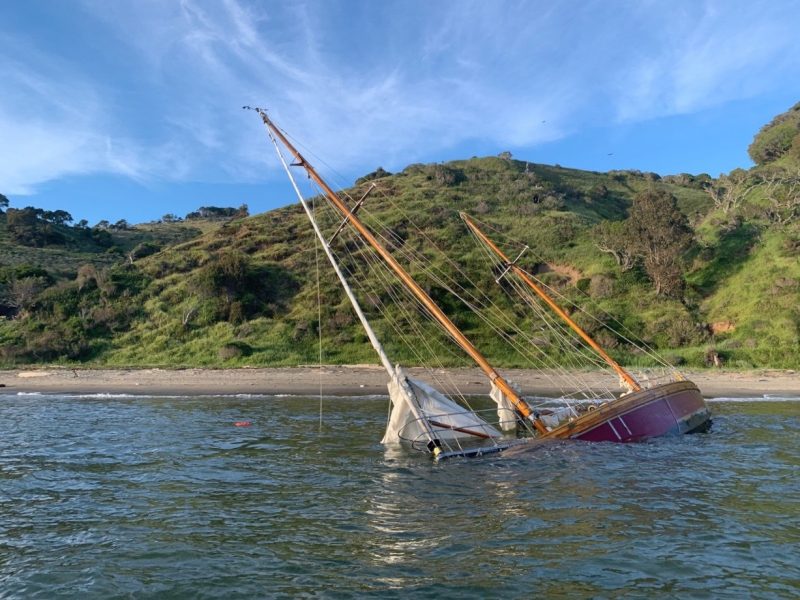
It’s not clear why Peregrine, a 1946 38-ft custom wooden yawl owned by Captain Stephan Sowash, went down. The boat was refloated quickly.
“I want to thank Parker Diving,” Sowash told us by phone this morning. “Those guys did a hell of a job. It was a very difficult and dangerous place to work — right in the surf line. They also managed to retrieve a few mementos from the boat.” Sowash also wanted to let mariners know about the difficulties of anchoring at Perles Beach. He said that Parker Diving also struggled to hold their position after they dropped their hook.
We’ll have more on this in a future Latitude article.
“Along with other local agencies responding, this was a USCG Sector San Francisco response case,” a Coast Guard spokesperson told us yesterday. Their public affairs team is still pulling together information about the rescue.
When Captain Jay Grant, the skipper of Seaward, saw Peregrine on Saturday, “The boat had airbags under it and sails halfway up. They seemed to pump out enough water to eventually take it over to be hauled out.”
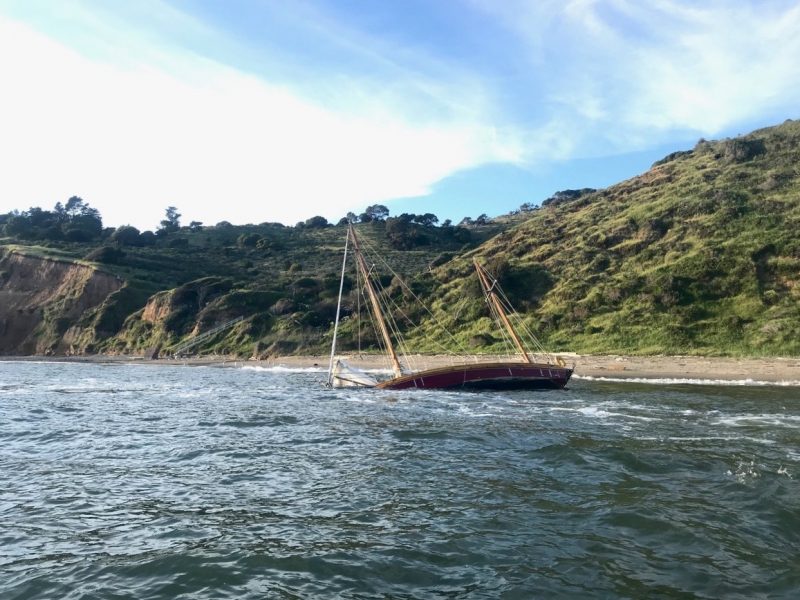
“While we were out sailing, we heard a vessel calling Vessel Assist for help,” Grant continued. “At that time, the vessel was aground and the tide was going out, leaving it mostly high and dry.”
Unique Challenges of Community Youth Sailing Programs
While volunteers at Alameda Community Sailing Center were getting their space ready for the recent Spring Sailing Camp at their Encinal Boat Ramp location, they saw the need to do something about all the weeds that have grown in the boat storage area.

In addition to sailing skills, an important component of all youth programs is teaching young sailors an appreciation for the environment as well as good stewardship practices. This meant a ‘green’ method of weed removal was paramount. The solution? Borrowing some black sheep to graze throughout the camp boat storage yard until they’d devoured all the weeds. Now, with the weeds gone, instructors and volunteers can focus on the more important aspects of sail training like gudgeon and pintle repair and sail repair, and keeping boats on the water filled with smiling kids.
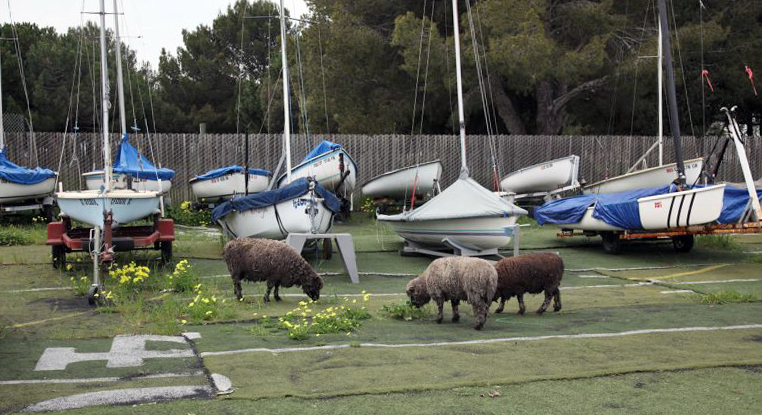
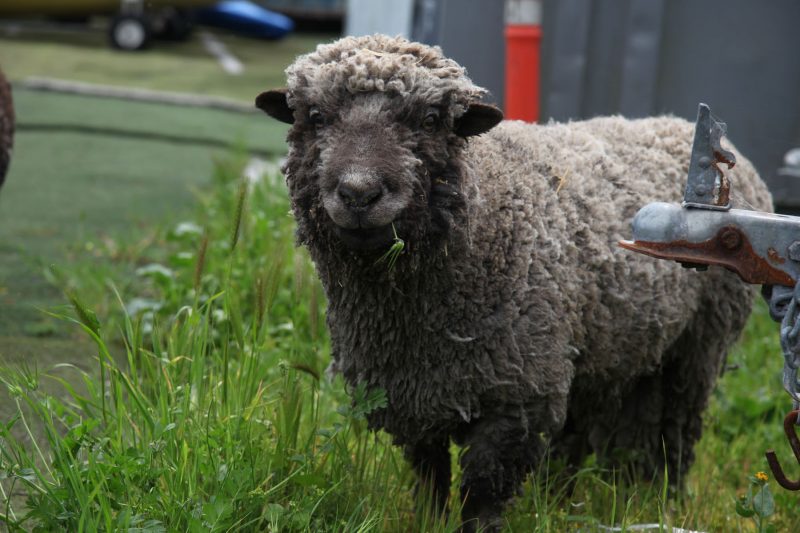
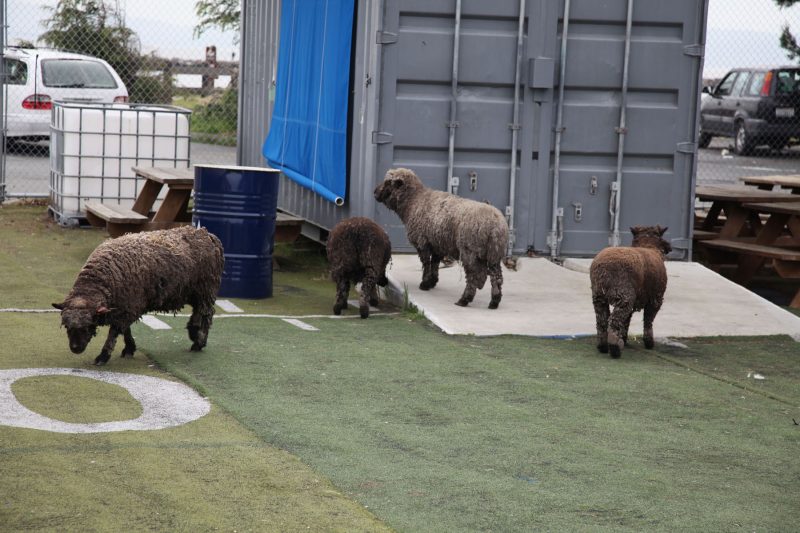
We understand some of these sheep are hoping to win the ‘Barn Door Trophy’ in the upcoming 50th Transpac. To learn more about Alameda Community Sailing’s upcoming summer programs, please see Sail Alameda.
Catamaran Cruising with Modern Sailing
R2AK – Beware the Ides of April
Taxes or the R2AK . . . ? R2AK or taxes . . . ? Eenie, meenie, miney . . .
April 15 wasn’t just the deadline for filing tax returns, it was also the deadline for signing up for the wild and crazy Race to Alaska. So if you were juggling sending Uncle Sam more money against obsessing about spending two weeks on a boat freezing your tush off while dodging tidal races and the occasional bear — we hope you filed an extension and got your butt and boat up to Port Townsend.
So far, there are 33 entries who did not wait until the last minute to enter the fifth running of the R2AK, which starts on June 3.
The appeal — or revulsion, depending on how you look at it — of the R2AK is the simplicity of its concept: Get your vessel of choice 750 miles up the Inside Passage from Port Townsend to Ketchikan without using a motor or any outside help. With a route known for large stretches of no wind or howling wind — and occasional short interludes of ‘just right’ wind — the fleet is a weird, wonderful and mongo-eclectic mix of new, old, monohulls, multihulls, ultralights, ultraheavies, and a number of boats that don’t even have sails. Rowing and paddling are allowed, and there are currently eight human-only powered entries, including a guy on a stand-up paddleboard who completed the course last year and is back again in 2019. (Sleep is allowed, and many boats anchor or pull onto a beach at night for some well-earned rest.)
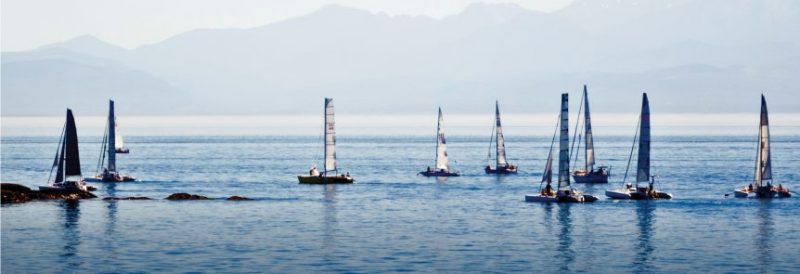
There are no handicaps. The first boat to arrive gets $10,000. The second boat, a set of steak knives. Really. (Any Glengarry Glen Ross fans out there?) The rest get to survive, lick their wounds, take three-hour hot showers, consume gallons of cold beer — and, quite often, come back to do it again next year. Go figure.
Multihulls won the first three R2AKs. Last year, the seven-woman team on First Federal’s Sail Like A Girl, a Melges 32 modified with two pedal drives turning small propellers, cleaned everyone’s clock. And leave it to women to return sailing to a ‘gentleman’s sport’ — after expenses, the team donated the remainder of their win to breast cancer research.
As with the IRS, you can be late with your R2AK paperwork, but it will cost you a bit more. Slightly pricier entries will continue to be accepted up until race day.
For more on the Race to Alaska — or just to enjoy some hilarious writing whether you’re going or not — log onto www.r2ak.com.
Has Anyone Lost a Dog?
Workers on an oil rig in the Gulf of Thailand were astonished to spot a dog swimming toward the structure last Friday — especially so, since the rig lies 135 miles from the nearest land.
It took about 15 minutes to get the shivering, exhausted pup onto the deck, where he was given water and food. Once dried off and warmed up, the little dog seemed to make a quick recovery and soon endeared himself to the crew. They named him Boonrod, which means “He has done good karma which helps him to survive.”
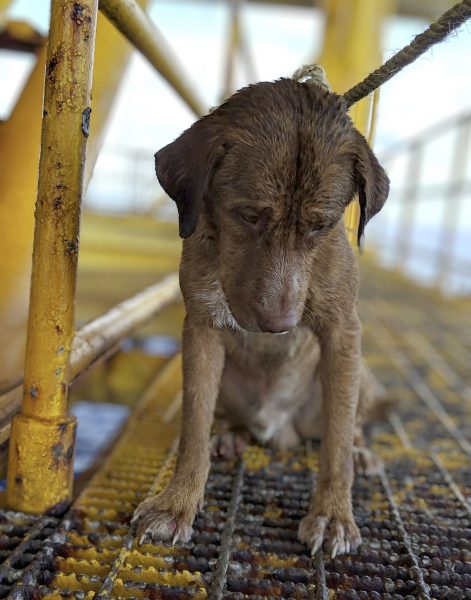
Dogs are good swimmers, and the maritime history is full of stories about canines making long and/or dangerous swims. (When Napoleon was knocked overboard in rough seas during his escape from Elba in 1815, a Newfoundland dog reportedly jumped in and kept the Emperor afloat until he could be picked up.)
But not this far. The theory is that the dog most likely fell off a fishing boat. We note it here, because cruising sailors also frequent the Gulf of Thailand. Has anyone out there lost a dog off Southern Thailand recently?

After a day and a half, Boonrod was transferred ashore where a veterinarian pronounced him in good health. Victor Payalaw, an offshore planner for Chevron Thailand, who aided in the rescue, plans to adopt Boonrod when his duty cycle is up at the end of April.

